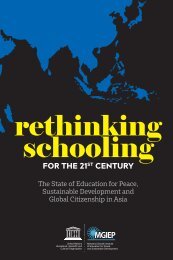The Blue DOT Issue 13
Reimagining Education: Beyond the Rhetoric
Reimagining Education: Beyond the Rhetoric
Create successful ePaper yourself
Turn your PDF publications into a flip-book with our unique Google optimized e-Paper software.
CHIEF EDITOR’S<br />
MESSAGE<br />
Education:<br />
Beyond the Rhetoric<br />
DIRECTOR’S MESSAGE<br />
“Look again at that dot.<br />
That’s here. That’s home. That’s us.<br />
On it, everyone you love,<br />
everyone you know, everyone you ever heard of,<br />
every human being who ever was,<br />
lived out their lives.<br />
<strong>The</strong> aggregate of our joy and suffering<br />
thousands of confident religions,<br />
ideologies, and economic doctrines,<br />
every hunter and forager, every hero and coward,<br />
every creator and destroyer of civilization,<br />
every king and peasant, every young couple in love,<br />
every mother and father, hopeful child,<br />
inventor and explorer, every teacher of morals,<br />
every corrupt politician, every superstar,<br />
every supreme leader, every saint<br />
and sinner in the history of our species lived thereon<br />
a mote of dust suspended in a sunbeam.”<br />
CARL SAGAN<br />
PALE BLUE <strong>DOT</strong>: A VISION OF THE HUMAN FUTURE IN SPACE<br />
Dear Friends,<br />
Happy New Year 2021. I wish your loved<br />
ones and you good health, and peace.<br />
At the beginning of 2020, not many of<br />
us would have imagined that we would<br />
be locked up in our homes for most<br />
of the year, transitioning to work from<br />
home, with most schools shutting down<br />
the world over and our children being<br />
forced to adjust to the ‘new normal’ of<br />
remote learning. <strong>The</strong> world has changed<br />
significantly and I believe the COVID-19<br />
pandemic has brought to fore three<br />
overriding acknowledgements:<br />
1) <strong>The</strong> first one is that humans are<br />
really struggling to live in peace<br />
with ourselves, trying to come to terms<br />
with the change that has overtaken our<br />
lives. While this trend has been on the<br />
rise even pre-COVID, the pandemic has<br />
re-enforced this further. According to<br />
WHO (2015), 25% of children between<br />
<strong>13</strong> and 15 years have some form of mental<br />
health issues, including stress, anxiety<br />
and depression – a statistic that is quite<br />
disturbing. <strong>The</strong> same report highlights<br />
another disturbing statistic – that over<br />
800,000 suicides are reported every year<br />
across the globe amongst young people.<br />
When we discuss sustainable development<br />
and sustainability – this is definitely one<br />
trend that is not sustainable.<br />
2) <strong>The</strong> second issue is that we are<br />
struggling to live with each other<br />
– brought to fore by the systemic racism<br />
and intolerance prevalent globally. In a<br />
2015-2016 survey conducted by MGIEP<br />
globally, in which we collected 1,200 youth<br />
responses from 120 countries, many felt<br />
that in times of national security – it was<br />
okay to use force against others or it was<br />
okay for some to have more opportunities<br />
than others – again, a very disturbing<br />
trend.<br />
3) And the third issue is living in peace<br />
with nature – viewing ourselves as<br />
part of nature (not divorced from it) and<br />
respecting nature as a living entity<br />
<strong>The</strong>se issues reiterate the need for change,<br />
which must start with ourselves. And what<br />
better way than through our education and<br />
learning systems, which present various<br />
opportunities that I detail below in four<br />
propositions:<br />
1) Proposition 1 – <strong>The</strong> education system<br />
that we have perpetuates the existential<br />
crisis we find ourselves in today because we<br />
look at education purely as an instrumental<br />
perspective – as a means to an end – an<br />
end which is material wealth and social<br />
status, propagating the I vs you and the us<br />
vs them – this needs to be deconstructed.<br />
2) Proposition 2 – We need an education<br />
for human flourishing – flourishing in a<br />
way that you have freedom to achieve the<br />
life that you value. We need an education<br />
system that trains us to be curious, to<br />
enquire and to be critical for our own<br />
understanding rather than just taking in<br />
what the teacher says. Additionally, we<br />
need systems that train us to be kind,<br />
compassionate and empathetic.<br />
3) Proposition 3 – A science and<br />
evidence-based approach to design such<br />
education systems as it is complex.<br />
4) Proposition 4 – Lastly, we need to<br />
relook at how we assess learning – it has<br />
to be continuous, dynamic, interactive,<br />
individualised – as opposed to being a<br />
one size fits all approach – where failure is<br />
embraced as a learning process.<br />
<strong>Issue</strong> <strong>13</strong> of <strong>The</strong> <strong>Blue</strong> <strong>DOT</strong> aims to<br />
go beyond the rhetoric by addressing<br />
the four propositions presented above<br />
in our quest to build peaceful and<br />
sustainable societies. This <strong>Blue</strong> <strong>DOT</strong><br />
issue aims to propose new ways<br />
of looking at education systems in<br />
terms of content, evaluation and<br />
assessments, pedagogy, the role<br />
of the teacher, and capturing and<br />
integrating voices of the youth in<br />
education systems. We hear from<br />
experts and youth around the world as<br />
they present inspiring solutions and ideas<br />
that are based on evidence and backed<br />
by the sciences for an interconnected,<br />
interdependent world.<br />
I hope you enjoy reading this issue as<br />
much as we enjoyed working on it – and<br />
as always I look forward to receiving<br />
your feedback on how we can work on<br />
improving future issues of <strong>The</strong> <strong>Blue</strong> <strong>DOT</strong>.<br />
ANANTHA KUMAR DURAIAPPAH<br />
0 1

















